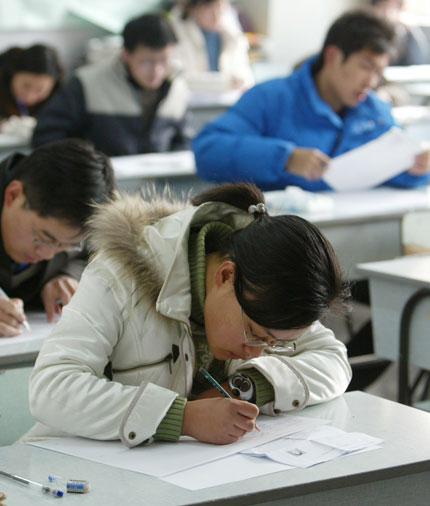Let's be civil
 |
|
About 1.04 million people sit for the 2009 national civil service exam in December. They compete for 13,566 positions. The general passing rate was 1:77. |
Once many young Chinese aspired to only high-flying, highly paid jobs, and never considered humble civil service. But a government job today has become a coveted "golden rice bowl" and the exam on Saturday is packed. Yao Minji investigates.
Janice Chen, 24, works in a state-owned bank and her fiance will be graduating with a master's degree in finance, generally considered an excellent ticket to success.
But her father wants her fiance to go into the civil service, which he himself left 30 years ago for brighter prospects in the private sector.
The fiance, bowing to her father, has registered to take the exam in Shanghai this Saturday and hopes to work for the government, a secure job. Once termed an "iron rice bowl," today China's civil service is known as a "golden rice bowl."
Around 1 million people around the country are expected to take the exam for 15,000 positions, 2,000 more than last year. About 84 percent of the positions require a bachelor's degree. Ministry of Education and other fields are said to require a master's degree at minimum.
And the notoriously difficult exam is just the first part. There are interviews, a physical and often a background check, for political reliability and solid family background.
Officials say the aim is to upgrade the quality of China's government service - from the central government down to regional and local divisions.
And, it helps young people in a tough job market, but here too the competition is fierce.
"Dad wants the best for me and he doesn't want us to go through all the difficulties he has experienced, especially after the economic crisis," says Chen.
"Plus, a civil servant always gets home on time so that my boyfriend and I will have more time together. My parents never had that time until they got old," she adds.
Thirty years ago her father, today a successful retired businessman, quit his civil service job in the Zhejiang Provincial Price Setting Bureau and boldly went into the import-export business for the challenge, the potential and the money.
In his day, an "official" civil service career was considered stable, though not particularly well paid and definitely lacking in desirable connections and prospects for advancement.
Chen's grandparents today often accuse her uncle, who remains a public servant, of lacking "enough courage and talent" to quit the "iron rice bowl" along with her father and become an entrepreneur.
But today a civil service career is one that the Chen family can be proud of.
The civil service exam has become a legend in China due to its enormous popularity and limited recruitment; passing it and landing a job confer a kind of status.
Once passing the notoriously difficult imperial exam, based on knowledge of the classics and specialty, such as revenue taxation and agriculture, gave scholars a place in the government, and that exam persisted for more than 2,000 years until it was abolished in 1905 in the Qing Dynasty (1644-1911) in attempts at modernization. Working for the government is still considered stable, but not exciting, still lacking in opportunities for significant advancement.
But since the global financial crisis and unnerving economic slowdown (which China has weathered), stability is everything.
Chen says she and her boyfriend support her father's job choice for them "because it is just really difficult to find good jobs these days and we just don't want to suffer the ups and downs."
In ancient China, an official career in government administration was considered the best path for excellent and diligent students. A good post could be a plum, and there was advancement.
For many years, China has followed the Confucian saying: "He who excels in study can follow an official career."
With China's rapid development in the 1980s and 1990s, however, many people changed their ideas. Some civil servants, like Chen's father, quit their secure jobs to go into business and succeeded. They became models.
Finance, business, banks and foreign companies became popular career choices, for the high-income level, status and career potential.
 0
0 







Go to Forum >>0 Comments